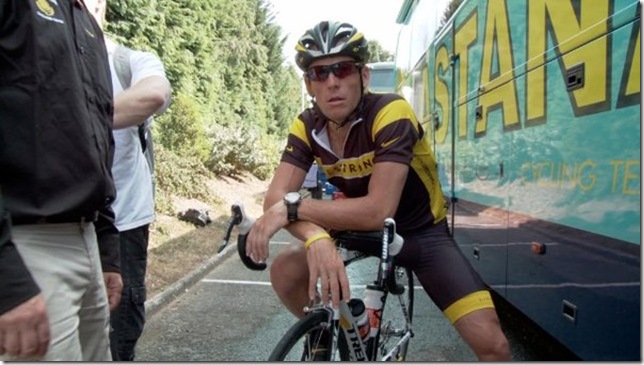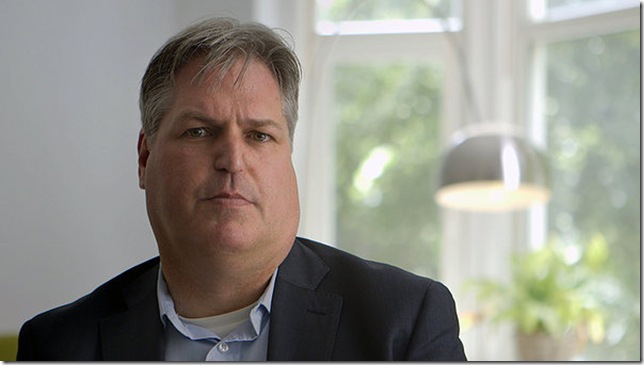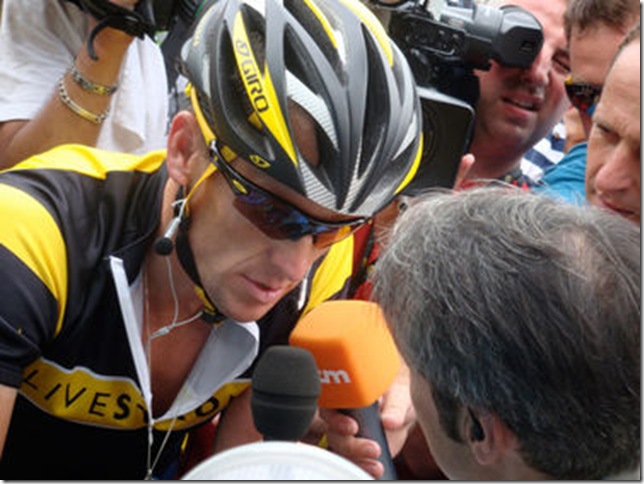Opening this weekend locally is The Armstrong Lie, a documentary chronicling Tour de France cycling legend Lance Armstrong’s improbable rise and ultimate fall from grace for using performance-enhancing drugs.
It was directed by Alex Gibney, winner of the 2007 Oscar for the documentary Taxi to the Dark Side. Gibney began this project as a positive story of one man’s comeback from a medical crisis, but the film changed drastically when Gibney realized that he was among the many who had been lied to. He spoke recently with Palm Beach ArtsPaper’s Hap Erstein.
Erstein: You started to make a film about Lance Armstrong’s miraculous comeback to Tour de France cycling after beating testicular cancer. That sounds like quite a departure for you after hard-hitting exposés of the powerful, like Enron: The Smartest Guys in the Room and Casino Jack and the United States of Money. What attracted you to this subject?
Gibney: Honestly, I saw it as a film about will. I’ve been interested in sports and I thought this was an opportunity to make a film about a guy who had an extraordinary will. Maybe a will that had both an inspirational side and a rather dark side. You know, a win-at-all-cost ethic.
Erstein: When you began the project, you didn’t know much about cycling, did you?
Gibney: I knew zero about cycling, that’s true. But I had a bit of confidence from my experience in the past with Enron. I didn’t know anything about accounting when I started the Enron film. And the fact is when you’re trying to explain things to a broad audience, it helps sometimes if you go in from scratch knowing what you don’t know and you’re determined to learn.
Erstein: When you began the film, did you have a personal opinion of Lance Armstrong?
Gibney: To be honest, I’m ashamed to say I didn’t know that much about him. I mean, I was aware of the allegations of doping, but it wasn’t a sport I had really followed. He was a celebrity, but he wasn’t somebody who was in my field of vision that much.
Erstein: And as a journalist, you try to stay as impartial as possible?
Gibney: Sure, you always want to be fair. And also as a filmmaker I was interested in this, because I was going to have the opportunity an ongoing sports story. Rather than digging back into the entrails of a scandal, to tell an ongoing sports story seemed really appealing.
Erstein: Armstrong afforded you close and frequent access to himself. What were the limitations and conditions placed on you?
Gibney: We couldn’t just walk up to him at any time. I’d come by his hotel room from time to time, but I’d have to let him know I was coming. Over time, we had a good bit of access, but that also ended up costing me for a while because people assumed that because I had such good access I was in the tank. And so his critics wouldn’t talk to me, even though from the get go, I was perfectly happy to talk to them so long as they had some kind of tangential relationship with the 2009 comeback.
Erstein: Did you have any agreement with Armstrong about his approval of the final film?
Gibney: He had no approval, no right of editorial control. The only proviso was that if there were allegations of doping, we had to give him an opportunity to respond. And I thought that was fair. That’s what I would do normally anyway.
Erstein: So, in effect, he was pretty confident that he could charm you and lie to you too?
Gibney: Correct. I think that was the idea, that I was going to go along for the ride. It was a little bit like the Bond films, where the charming villain says, “Sure, c’mon, come aboard my big boat, see if you can find the atomic weapons that I’m keeping underneath.”
Erstein: On any documentary, you try to stay loose and see where the story leads you. But have you ever had a project change as drastically as this one did?
Gibney: No, I really don’t think so. I mean obviously some changed, but nothing this drastic. This went from a story of redemption to a story of complete collapse.
Erstein: What was the tipping point? When did you realize the story was the Armstrong lie?
Gibney: I think we realized it was likely going in that direction when the federal investigation started. Obviously when there’s a grand jury investigation and they’re investigating alleged drug trafficking, conspiracy, tax evasion, that’s a bigger story, a bigger deal, than somebody who may have slipped a couple of pills in his mouth from time to time.
And honestly, in the first story — The Road Back, it was called — he was going to have to confront allegations that had been made in the past. I don’t think any of us realized how much he was going to have to confront them, but I sensed even at the beginning that he would. So things changed once we began to realize that the allegations were not only richer and deeper than we had supposed, but now more provable.
Erstein: This wasn’t the film Sony expected to get. How did they react?
Gibney: Sony at some point also realized that the film that we had mostly completed really couldn’t be released. Not within the context of what was starting to be revealed. So for quite a while, they wrote it off. But once we knew what was happening with the criminal investigation, Sony Classics said, “Look, we’d really like to take this on,” and we geared back up.
Erstein: If one has no interest in cycling or sports in general, isn’t there a larger point here?
Gibney: I think the larger point is how a lie can hide in plain sight, because sometimes we let it. Sometimes there are stories that we want to believe in so much that we suspend our disbelief and allow ourselves to be fooled. This is a story that in that way is not dissimilar from Enron. We wanted to believe in the Enron story, right up until the end when it collapsed. It teaches us a lesson about how to see. Sometimes when a story seems too good to be true, it is.
Erstein: Stories of dishonest heroes, on and off the field, have become commonplace. What makes Lance Armstrong’s story stand out?
Gibney: I think it’s his struggles and victory over cancer. And also his is the most spectacular story. He has a great ability as a storyteller and he told a story that was maybe the best story in the history of sports.
And the cancer story is real. He did come back from cancer, he did survive and he was better. But I think the problem with Armstrong, the moral problem with Armstrong, is that that wasn’t enough for him. I think that’s an American problem. We need to make the story so big and so perfect, and Armstrong certainly did that in spades. He couldn’t just say, “Look, I’ve never tested positive,” he had to say, “How dare you say that I as a cancer survivor would ever use performance-enhancing drugs?”
Erstein: If he hadn’t tried the comeback, he would have gotten away with it, right?
Gibney: He would have, yes. I don’t think there’s any doubt about that.
Erstein: Tell me about the Lance Armstrong you got to know.
Gibney: I do think that he does have tremendous will. As an athlete, I am impressed by him, because he does have guts, he does have determination and those are things we admire.
I also recognize that his cruelty to other people may have been one of his big advantages on the bike, but it turned out to be a terrible disadvantage off the bike. Hanging out with Lance Armstrong on a day-to-day basis, I rather like him. But you often have to separate that from his actions.
Erstein: Could you trust anything he said? Did he confine his lying to the issue of doping?
Gibney: Everything he says now you have to take with a grain of salt. However, I do believe that there are certain moments in the film where you can see him talking with candor, and the reason I think I believe them is that they’re the ones that don’t reflect so well on him.
And I think that was the problem he had. People were more comfortable with a beautiful lie than they were with the ugly truth. So when he’s telling us truths that we find a bit hard to take or ugly, I think that’s where he’s closer to being honest.
I did something unusual in this film, which was actually put myself in the film. And I would try to say from time to time when I felt that the real Lance was popping through. In the post-Oprah interviews, when he talks about how he used drugs and whether or not he expected to get caught and how it wasn’t such a big deal for him to sleep at night when he was thinking about the lie, those things are honest. We may not want to hear them, but they’re honest, I think.
Erstein: Did you grapple with the decision to put yourself in the movie? Isn’t that a documentary no-no?
Gibney: Not always, but I did grapple with that decision. I wasn’t in the first version of the film, but I felt in order to be able to understand the dynamics and complexity of the second film — which was both a sports film and also an investigative film — to move back and forth between those two versions, I had to put myself at the heart of the film. And that I think leads to a more complex understanding of how we get fooled by lies.
Erstein: You seem to put the camera in the middle of the race. How did you do that?
Gibney: We did something that as far as I know has never been done before. We put two cameras on the bikes of one of Lance’s domestiques. One pointing forward and one pointing back. And we had 10 cameras total, so we were able to shoot this even that allowed us to cut certain sequences like an action film.
Erstein: It seems likely that you will again be vying for an Oscar for The Armstrong Lie.
Gibney: I’m delighted with awards, but my big goal is to provoke and I just hope people like the movie.


